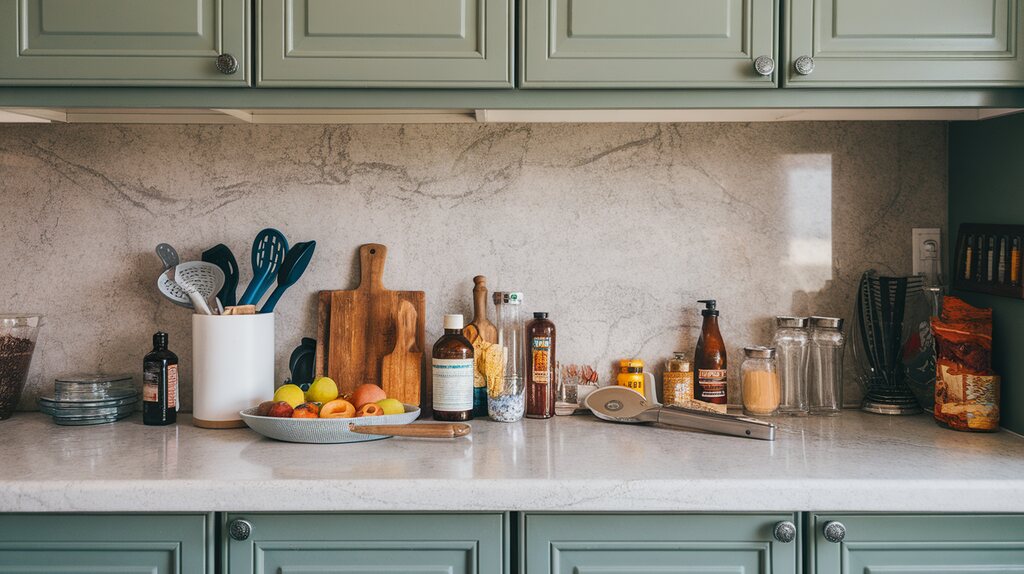Looking for the right countertop material for your kitchen or bathroom? Quartz might be your answer. As a top choice for homes today, quartz countertops offer practical advantages that make daily life easier.
In this article, you’ll learn the 7 key benefits of quartz countertops that set them apart from other options. From durability to looks, we’ll explain why so many homeowners choose quartz.
Our team has researched and tested various countertop materials for over 10 years. We’ve seen firsthand how quartz solves common problems other materials can’t.
If you’re wondering whether quartz is worth the investment, this guide will help you decide. We’ll cut through the marketing talk and give you honest facts about what quartz can (and can’t) do for your home.
7 Benefits of Quartz Countertops
Here are some benefits of quartz countertops
Superior Durability for Everyday Use
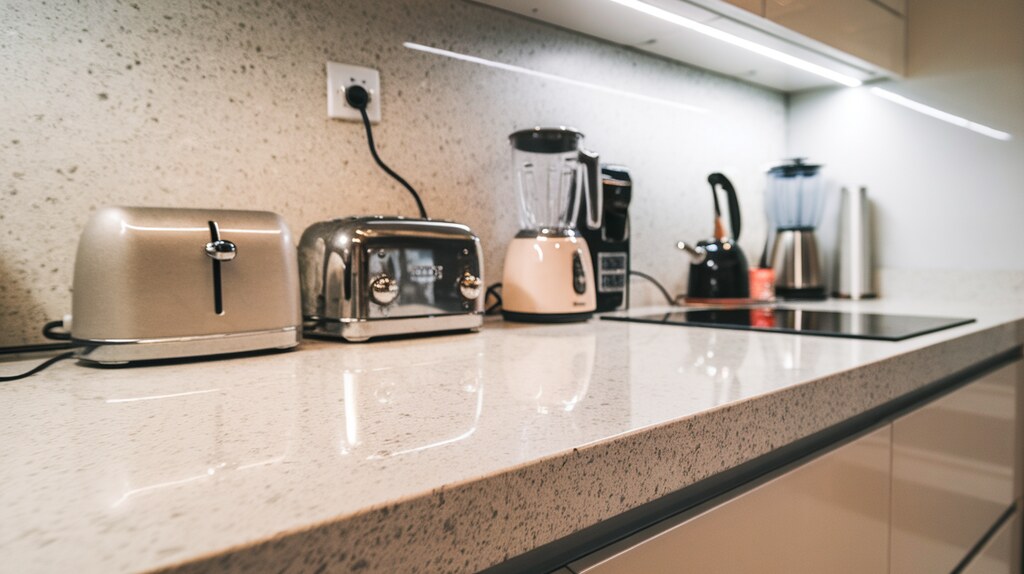
Your kitchen takes a beating every day. Pots drop. Knives slip. Hot pans need a place to rest.
I’ve seen many beautiful countertops ruined after just a few years of normal use. But quartz? It stands up to daily life like few materials can.
Quartz countertops are made from crushed natural stone mixed with resin. This creates a surface that’s:
- Resistant to chips and cracks
- Tough against scratches
- Hard enough to handle heavy pots and appliances
Ever drop a can from your cabinet? On many counters, that’s a disaster waiting to happen. With quartz, you can breathe easier.
What makes this possible? The engineered structure gives quartz more flexibility than natural stone. It can absorb impacts that would damage other materials.
For busy families, this means less worry about accidents. For anyone who uses their kitchen regularly, it means a counter that keeps looking good year after year.
No surface is completely indestructible – but quartz comes closer than most alternatives you’ll find.
Non-Porous Surface Resists Stains and Bacteria
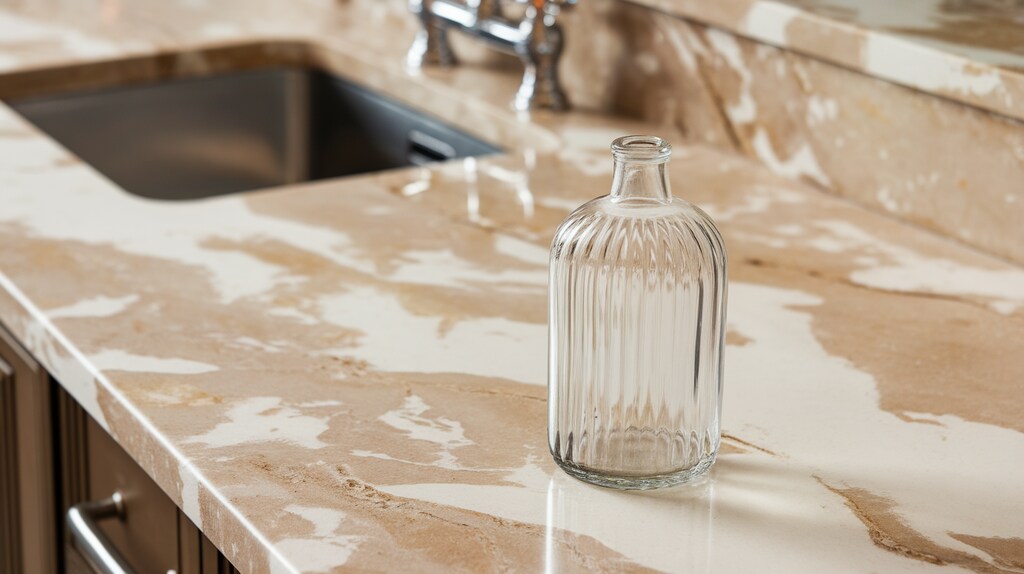
Ever spilled red wine or tomato sauce on your counter? With quartz, you can simply wipe it away.
I test countertop materials regularly, and quartz stands out for one big reason: it’s completely non-porous. This means liquids stay on the surface instead of soaking in.
Why does this matter for your home?
- No staining from coffee, wine, or cooking oils
- Less worry about raw meat juices
- Cleaning takes seconds, not minutes
Natural stone counters like granite and marble have tiny holes where liquids can hide. Quartz doesn’t.
Think about what touches your counters daily: raw chicken, eggs, and vegetable dirt. On porous surfaces, bacteria can grow in places you can’t see or reach.
Your quartz countertop eliminates this problem.
I’ve found this especially useful for families with young kids. Sticky juice spills? Messy art projects? Just wipe and go.
The non-porous quality also means you don’t need special cleaners or annual sealing treatments. Regular soap and water do the job perfectly.
This saves you time, money, and stress – three things we could all use more of in our lives.
No Sealing or Special Maintenance Required
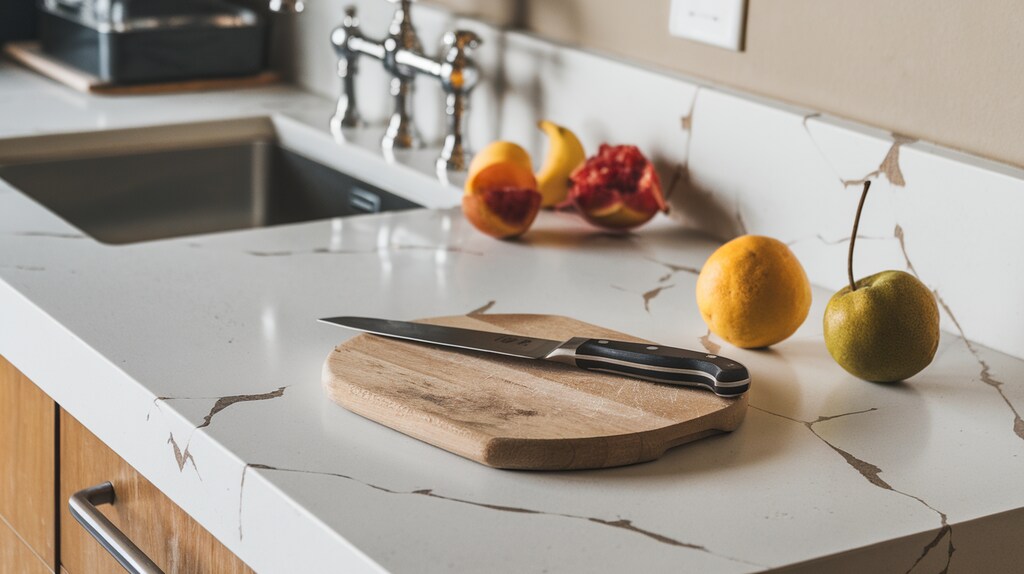
Who has time for extra chores? Not me, and probably not you either.
I’ve owned both granite and quartz countertops in different homes. The difference in upkeep is night and day.
With natural stone counters, I spent hours each year on maintenance:
- Applying sealant every 6-12 months
- Testing if the water beads correctly
- Worrying about missed spots
Quartz eliminates all of that work.
Why? The manufacturing process creates a material that’s already sealed. The resin that binds the quartz particles together forms a permanent barrier.
This means:
- No annual sealing weekends
- No special cleaning products to buy
- No panic when you forget maintenance
Your quartz countertop arrives ready for life and stays that way.
Simple cleaning is all it needs.
I just use mild soap and water for daily cleanup. For tougher messes, a non-abrasive cleaner works perfectly.
Think about what you could do with the time you save. Read a book? Watch a show? Play with your kids?
When you choose quartz, you’re choosing to make your life simpler. And in today’s busy world, that’s worth a lot.
Wide Range of Colors and Designs
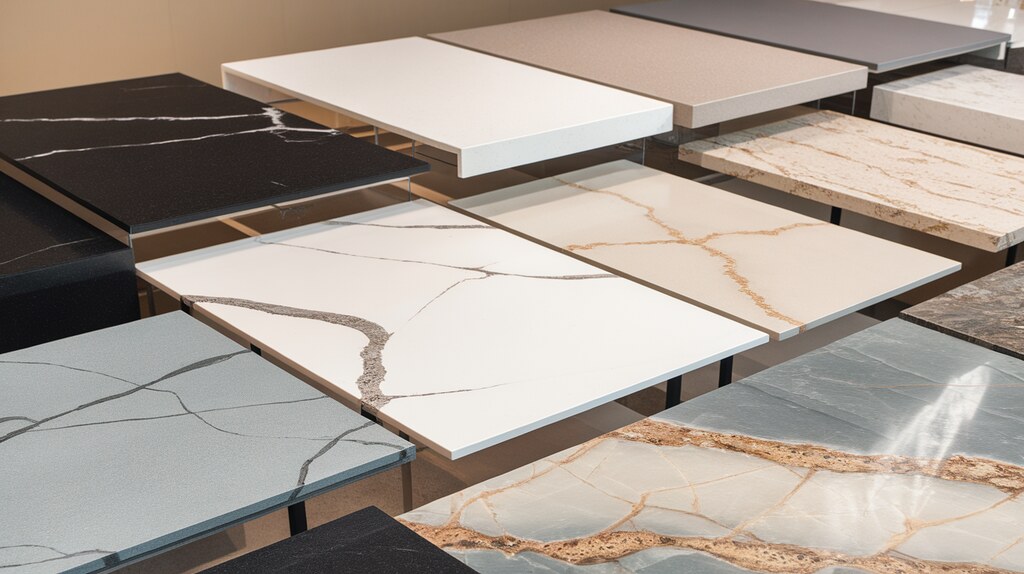
Want a counter that matches your exact vision? Quartz gives you options that other materials can’t.
I’ve helped many homeowners pick countertops, and the color range of quartz always impresses them. You can find:
- Pure whites that stay white (unlike marble that yellows)
- Deep blacks without the flecks in granite
- Blues, greens, and even reds not found in nature
But it’s not just solid colors.
Quartz can look like almost anything. Want the look of marble without the hassle? There’s a quote for that.
The patterns are consistent, too.
This is a big difference from natural stone. With granite or marble, what you see in a small sample might not match what’s installed. The slab could have unexpected spots or lines.
I remember one client who got a total surprise when her marble was installed. The sample showed subtle veining, but the full slab had a huge dark streak right in the center.
Quartz doesn’t play these tricks on you. The pattern you choose is what you get across your entire counter.
For your kitchen or bathroom, this means:
- Easier planning with other design elements
- More control over the final look
- Better matching between sections if you need multiple pieces
You get the style you want without compromise.
Consistent Appearance Without Natural Imperfections
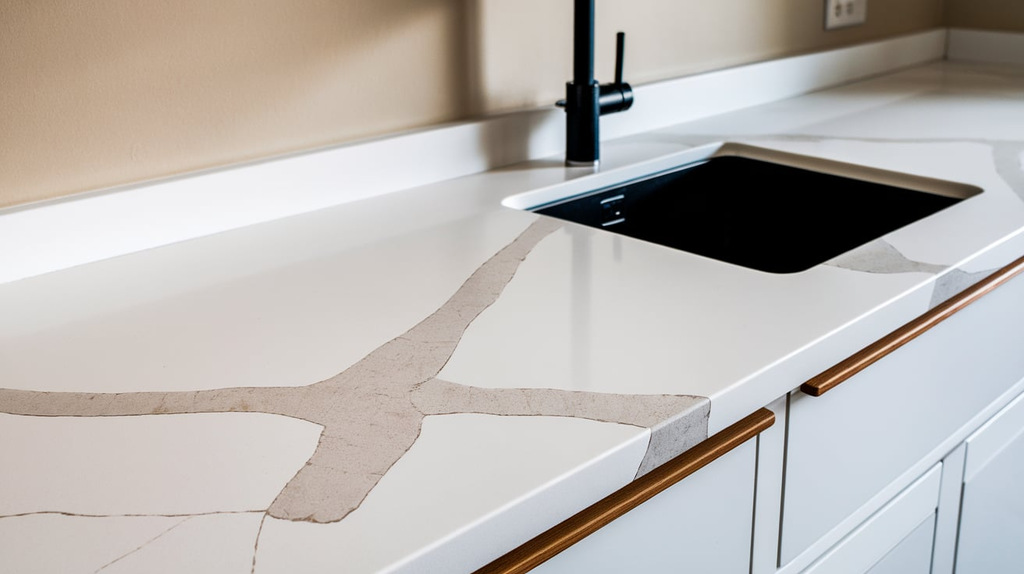
Have you ever seen a kitchen with mismatched counter sections? It’s a common problem with natural stone.
I visit homes with granite and marble counters that look different from one end to the other. Spots, lines, and color shifts can make your kitchen feel unplanned.
Quartz solves this problem completely.
Because it’s made in a factory (not cut from the earth), quartz offers something special: consistency.
What does this mean for your home?
- The island matches the perimeter.
- The sink area looks the same as the cooking zone
- No sudden color changes or weird marks
This matters most in open floor plans.
When you have a large kitchen or connected spaces, visual flow becomes important. Quartz keeps the look smooth throughout.
I worked with a family who had a massive kitchen island. With natural stone, they would have needed multiple slabs that might not match. Quartz gave them a perfect, uniform look across the entire surface.
For you, this means:
- Less stress during installation
- No surprises when pieces are put together
- A finished space that looks intentional and complete
The consistent nature of quartz gives you control. You choose the look, and that’s exactly what appears on every inch of your counters.
Eco-Friendly and Safe for the Home
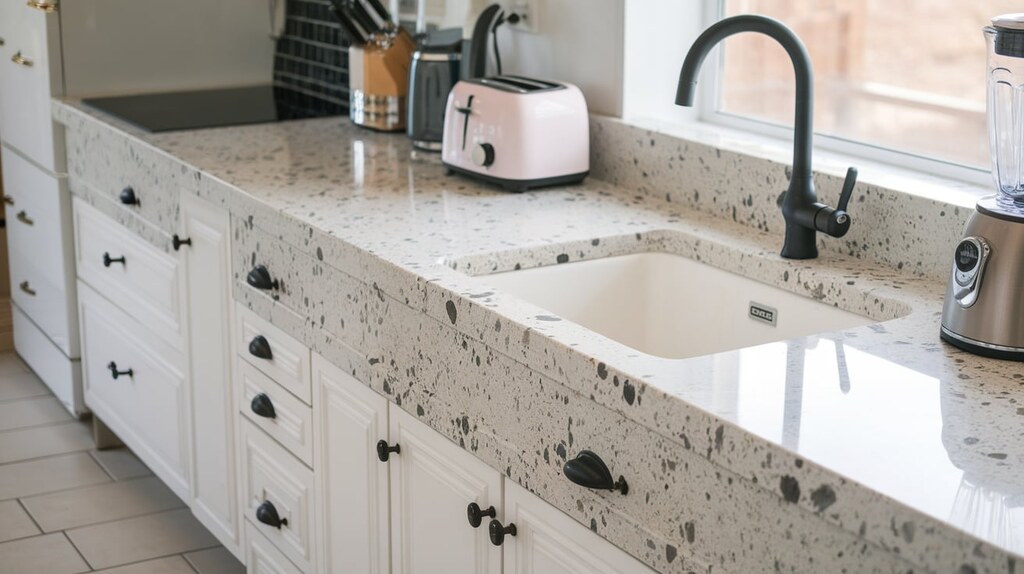
Is your family’s health a top priority? Mine too. That’s why I want to tell you about the safety benefits of quartz.
Many people don’t think about what their countertops might be adding to their indoor air. But they should.
Quartz stands out as a better choice for three main reasons:
- Many brands use recycled content from mirrors, glass, and industrial waste
- Low chemical emissions compared to other engineered surfaces
- No radioactive materials can be found in some granite
This matters for everyday living.
I’ve worked with parents who researched countertop materials for months before choosing quartz. They wanted surfaces that wouldn’t put harmful compounds into their home.
Quartz delivers on this need.
The best quartz brands are certified for:
- Low VOC emissions (the chemicals that cause that “new” smell)
- Food safety standards
- Meeting strict air quality guidelines
Your food sits directly on your counters. Your kids touch them daily. You prepare meals on them for years.
Shouldn’t they be as safe as possible?
With quartz, you get a surface that’s not just pretty and practical—it’s also better for your family and the planet.
And for those looking to build “green,” many quartz options can help earn points toward green building certifications.
High Resale Value and Long-Term Cost Efficiency
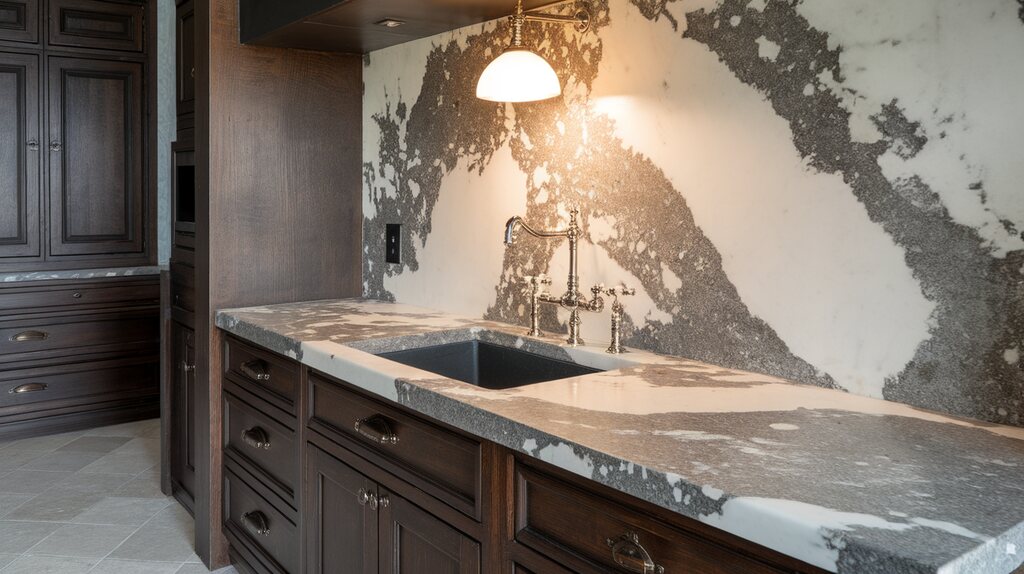
Thinking about your home as an investment? Smart move. I always tell my clients to consider the long game when picking countertops.
Quartz costs more upfront than some options. I won’t hide that fact. But let’s look at the full picture:
- Money saved on sealing products (zero dollars spent, ever)
- No repair costs for chips and cracks that plague other materials
- Less replacement expense since quartz lasts for decades
The math makes sense over time.
I’ve talked with real estate agents who confirm a key fact: quality countertops help sell homes faster and for better prices.
But not all countertops are equal in buyers’ eyes.
When people tour homes, they touch the counters. They look closely at them. They imagine preparing meals there.
Quartz makes a strong impression because it:
- Still looks new years after installation
- Doesn’t show wear like laminate or butcher block
- Has a premium feel that says “quality home.”
Your investment pays off in two ways. First, you enjoy a problem-free surface while you live there. Second, you potentially recoup much of your cost when you sell.
One of my clients installed quartz ten years ago. When they sold their home last year, the counters looked almost new. The appraiser specifically mentioned them as a value-adding feature.
That’s money well spent.
Conclusion
Is quartz the right choice for your home? Based on these benefits, I believe it’s worth serious consideration.
Your countertops are the backbone of your kitchen or bathroom spaces, which you use every day. I’ve seen how the right material can make life easier.
The decision is personal, of course.
Your budget, style, and needs matter most. But when clients ask what I’d put in my own home? Quartz is my answer.
Take your time deciding. Look at samples in different lights. Touch the surfaces.
The perfect countertop is the one that works for your unique home and life.
FAQs
How much do quartz countertops cost?
Quartz typically costs $50-150 per square foot installed. Most homeowners spend $3,000-7,000 total for an average kitchen.
How long do quartz countertops last?
With proper care, quartz can last 20-30 years or longer. Most manufacturers offer warranties of 10-15 years, backing their durability.
Can you put hot pans on quartz?
No. Always use trivets or hot pads. Extreme temperature changes can damage the resin binding in quartz countertops.
Is quartz better than granite?
Quartz offers easier maintenance and a consistent appearance. Granite provides unique patterns and slightly better heat resistance. Your priorities determine the better choice.
How do you clean quartz countertops?
Clean with mild soap and water. For stubborn spots, use non-abrasive cleaners made for quartz. Avoid harsh chemicals and scouring pads.

